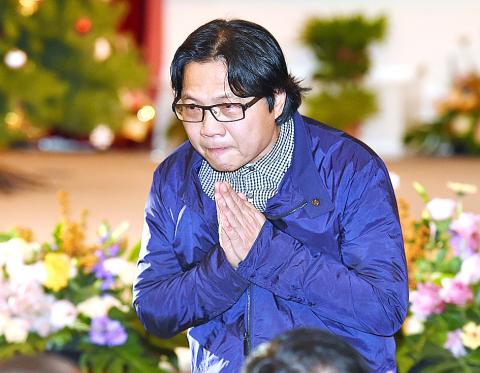A group of academics yesterday launched a petition to request that the Ministry of Education revoke its decision to appoint National Taiwan University (NTU) professor Kuan Chung-ming (管中閔) as the university’s president.
Among the academics were Academia Sinica academicians Chen Lan-bo (陳良博) and Chou Chang-hung (周昌弘), NTU professor Jang Show-ling (鄭秀玲), NTU professor emeritus Ho De-fen (賀德芬), NTU adjunct professor Chang Ching-hsi (張清溪) and Taiwan Association of University Professors president Lin Hsiu-hsin (林秀幸).
Although the Executive Yuan said that it cannot revoke the ministry’s decision to appoint Kuan, there are “valid legal means” to do so, they said in a joint statement.

Photo: Liao Chen-huei, Taipei Times
Kuan was elected NTU president on Jan. 5 last year and was originally scheduled to take office the next month, but the ministry in May demanded a re-election on the grounds that Kuan failed to disclose a possible conflict of interest in the election, as he served as an independent director at Taiwan Mobile Co and company vice president Richard Tsai (蔡明興) sat on the election committee.
Former minister of education Yeh Jiunn-rong (葉俊榮), who took office in July, initially instructed the university to redo parts of the election without Tsai to correct what he called a “procedural flaw” in the process.
However, after the university repeatedly refused, citing a lack of legal basis, Yeh on Monday last week announced that he would “reluctantly agree” to Kuan’s appointment and ordered the university to submit a report reviewing the controversies that arose during the presidential election.
He tendered his resignation the following day after the decision drew a backlash.
Yeh’s announcement came just two days before the Executive Yuan rejected three administrative appeals filed by the university, Kuan and a group of NTU students requesting that Kuan be appointed based on their interpretation of the law.
Yeh must have known that the Executive Yuan would reject the appeals and decided to appoint Kuan in advance without the approval of Premier William Lai (賴清德), the academics said yesterday.
While Yeh’s behavior was “extremely ridiculous,” what they found “most regrettable” was the Executive Yuan’s claim that Kuan’s appointment cannot be revoked, they said.
Article 117 of the Administrative Procedure Act (行政程序法) stipulates that government agencies and their superior authorities can revoke a previously issued administrative injunction that is found to be illegal and falls within their jurisdiction, they added.
As an NTU presidential candidate has filed an administrative appeal against the Executive Yuan over Kuan’s appointment, the ministry should review whether its decision to appoint him is legal, as stipulated in Paragraph 2, Article 58 of the Administrative Appeal Act (訴願法), and revoke the decision, the academics said, referring to an administrative appeal filed by NTU professor Wu Ruey-beei (吳瑞北) on Friday last week.
Meanwhile, Yeh has contravened the Public Functionary Service Act (公務員服務法), which bans civil servants from contradicting a superior’s instructions that fall within their jurisdiction and promoting the personal interests of themselves or others by abusing their position, they said.
By “debunking the government’s lies” about the appointment being irreversible, the academics said that they hope more people would join their call to revoke Kuan’s appointment before he takes office on Tuesday next week.

US climber Alex Honnold is to attempt to scale Taipei 101 without a rope and harness in a live Netflix special on Jan. 24, the streaming platform announced on Wednesday. Accounting for the time difference, the two-hour broadcast of Honnold’s climb, called Skyscraper Live, is to air on Jan. 23 in the US, Netflix said in a statement. Honnold, 40, was the first person ever to free solo climb the 900m El Capitan rock formation in Yosemite National Park — a feat that was recorded and later made into the 2018 documentary film Free Solo. Netflix previewed Skyscraper Live in October, after videos

NUMBERS IMBALANCE: More than 4 million Taiwanese have visited China this year, while only about half a million Chinese have visited here Beijing has yet to respond to Taiwan’s requests for negotiation over matters related to the recovery of cross-strait tourism, the Tourism Administration said yesterday. Taiwan’s tourism authority issued the statement after Chinese-language daily the China Times reported yesterday that the government’s policy of banning group tours to China does not stop Taiwanese from visiting the country. As of October, more than 4.2 million had traveled to China this year, exceeding last year. Beijing estimated the number of Taiwanese tourists in China could reach 4.5 million this year. By contrast, only 500,000 Chinese tourists are expected in Taiwan, the report said. The report

Temperatures are forecast to drop steadily as a continental cold air mass moves across Taiwan, with some areas also likely to see heavy rainfall, the Central Weather Administration (CWA) said. From today through early tomorrow, a cold air mass would keep temperatures low across central and northern Taiwan, and the eastern half of Taiwan proper, with isolated brief showers forecast along Keelung’s north coast, Taipei and New Taipei City’s mountainous areas and eastern Taiwan, it said. Lows of 11°C to 15°C are forecast in central and northern Taiwan, Yilan County, and the outlying Kinmen and Lienchiang (Matsu) counties, and 14°C to 17°C

STEERING FAILURE: The first boat of its class is experiencing teething issues as it readies for acceptance by the navy, according to a recent story about rudder failure The Hai Kun (海鯤), the nation’s first locally built submarine, allegedly suffered a total failure of stern hydraulic systems during the second round of sea acceptance trials on June 26, and sailors were forced to manually operate the X-rudder to turn the submarine and return to port, news Web site Mirror Daily reported yesterday. The report said that tugboats following the Hai Kun assisted the submarine in avoiding collisions with other ships due to the X-rudder malfunctioning. At the time of the report, the submarine had completed its trials and was scheduled to begin diving and surfacing tests in shallow areas. The X-rudder,